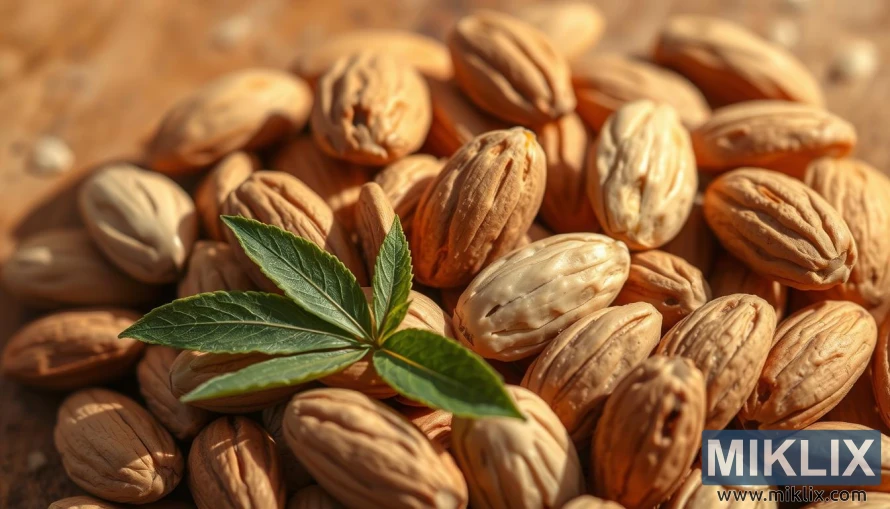Enjoying Almonds: The Small Seed with Big Benefits
Published: March 28, 2025 at 9:13:08 PM UTC
Last updated: April 3, 2025 at 1:25:46 PM UTC
Almonds are the edible seeds of the Prunus dulcis tree. They have become a global superfood, despite starting in the Middle East. They are full of healthy fats, antioxidants, and essential minerals, making them great for your health. They support your heart, bones, and metabolism. Their natural antioxidants fight cell damage, and their fiber helps with digestion.
These crunchy kernels are packed with magnesium, calcium, and vitamin E. They support heart, bone, and metabolic health. Their natural antioxidants fight cell damage, and their fiber helps with digestion.
Eating almonds is a simple way to add nutrition to your diet without extra calories. Let’s see how this simple snack can improve your health.
Key Takeaways
- A 1-ounce serving offers 6g protein, 3.5g fiber, and nearly half your daily vitamin E.
- Rich in monounsaturated fats, almonds help lower LDL cholesterol and protect heart health.
- Antioxidants like vitamin E in almonds fight inflammation and oxidative stress.
- High magnesium and calcium content supports bone strength, specially for non-dairy eaters.
- Studies show daily almond consumption may reduce inflammation and stabilize blood sugar levels.
What Makes Almonds a Nutritional Powerhouse
Almonds are packed with nutrients in every bite. A 1-ounce serving has 6 grams of protein, making them a top choice for plant-based foods. This almonds protein content is matched by 3.5 grams of fiber and healthy fats, keeping you full and energized. Let’s explore their almond nutritional profile:
- Vitamins in almonds: 48% of daily vitamin E (a powerful antioxidant) and 25% of riboflavin (B2) for energy.
- Minerals: 20% of magnesium for bone health, plus calcium and potassium for heart and muscle function.
- Fats: 14g total, with 9g monounsaturated fats that lower bad cholesterol.
Almonds offer consistent nutrients. Varieties like Nonpareil are known for quality and taste. All almonds have beneficial compounds like arginine for blood flow and polyphenols as antioxidants.
Their natural oils and fiber slow down sugar absorption, providing steady energy. Whether eaten raw, roasted, or blended into recipes, almonds’ balanced mix of protein, healthy fats, and vitamins makes them a versatile addition to any diet.
Almonds and Heart Health: The Cardiovascular Connection
Heart healthy almonds are backed by science for their cardiovascular benefits. Eating them regularly can lower LDL cholesterol, a major risk factor for heart disease. Studies show that 45 grams a day can cut LDL by 0.25 mmol/L and total cholesterol by 5.92 mg/dL.
These nuts are rich in vitamin E, magnesium, and unsaturated fats. These nutrients protect arteries and reduce LDL oxidation, which is linked to atherosclerosis.
Research shows almonds can improve lipid profiles. A 2016 meta-analysis of 18 trials found almond-rich diets reduced triglycerides and LDL while maintaining HDL. In a 2020 study, 30g daily for six weeks lowered LDL and total cholesterol in Indian participants.
South Asians, who often have higher heart disease risk due to dyslipidemia, benefit significantly. A 2021 study found almonds increased HDL by 14% in coronary patients. Pairing almonds with a balanced diet amplifies their cholesterol-lowering effects.
Enjoy 1-1.5 ounces daily as snacks or in meals to harness these almonds cholesterol-fighting properties. Small portions add up to big cardiovascular benefits without complicating your routine.
How Almonds Can Support Weight Management
Almonds are a great choice for those looking to lose weight. They are full of protein and fiber, which helps you feel full longer. A study showed that eating 1.5 ounces of almonds every day can help control hunger and reduce calorie intake.
Almonds are also good for your metabolism. Your body doesn't absorb all the calories from almonds, which helps with weight loss. One ounce of almonds has 4g of fiber and 15 nutrients, including magnesium and vitamin E. Even a small amount, like 1-2 ounces a day, can make you feel full without adding too many calories.
- Protein & Fiber: 1 ounce of almonds gives you 6g of protein and 3.5g of fiber, which slows digestion and keeps you feeling full.
- Calorie Efficiency: The way almonds are structured means your body absorbs fewer calories, making them good for your metabolism.
- Healthy Fats: Almonds have a lot of unsaturated fats, which are good for your heart and help you feel full.
Studies have shown that almonds can help with weight loss when part of a balanced diet. In a 9-month study, people who ate almonds as 15% of their calories lost 15 pounds in 3 months. Adding almonds to your meals, like on salads or as a snack, can help with weight loss. Choose unsalted almonds and watch your portion sizes to avoid eating too much. With 164 calories per ounce, they are a nutritious choice for weight management.
Blood Sugar Regulation and Diabetes Prevention
Almonds help manage blood sugar and lower diabetes risk. They have a low glycemic index, which slows down carb absorption. This helps keep glucose levels stable.
Almonds are high in protein, fiber and healthy fats. These nutrients slow digestion, preventing blood sugar spikes.
Magnesium in almonds is key for insulin sensitivity. One ounce has 18% of your daily magnesium needs. People with diabetes often lack magnesium.
Studies show magnesium helps control blood sugar. For example, a study found 1 ounce of almonds daily lowered hemoglobin A1c by 4% in 12 weeks.
Even small portions of almonds can make a difference. 1 ounce reduced post-meal glucose by 18% in Asian Indian adults.
Practical tips: Sprinkle almonds on salads, add to yogurt, or snack on a small handful. Pair with complex carbs to balance glycemic load. For best results, replace sugary snacks with almonds to maintain steady energy without blood sugar spikes.
With diabetes affecting 1 in 10 adults globally, simple swaps like adding almonds can make a measurable difference. Their unique nutrient profile supports long-term insulin health and glycemic control without compromising taste or convenience.
Brain Health Benefits of Daily Almond Consumption
Almonds are packed with nutrients that boost almonds brain health. They have a lot of vitamin E, which protects against damage that can slow down thinking. This makes almonds a great choice for almonds neuroprotection.
- Vitamin E: Protects brain cells from damage, supporting long-term almonds cognitive function.
- Omega-3 Fats: Build brain cell membranes and enhance almonds memory retention.
- B Vitamins: Support neurotransmitter production, aiding clear thinking and focus.
Studies on animals show almonds can improve memory and reduce anxiety. A 2022 study found that eating almonds before birth helped babies remember better and had healthier brains. While more research is needed, early results look promising for fighting memory problems.
Whether eaten raw or added to meals, almonds are a simple way to support brain health. Remember, eating them regularly in moderation is the best way to enjoy these benefits!
Digestive Health Advantages of Adding Almonds to Your Diet
Almonds are good for your digestive health because of their fiber. Each ounce has 3.5 grams of fiber, which is 14% of what you need daily. This fiber feeds the good bacteria in your gut, keeping it balanced.
Studies show that almonds' fiber helps soften stool and keeps bowel movements regular. This is thanks to both soluble and insoluble fibers.
Research from King’s College London found that almonds boost butyrate production. Butyrate is important for colon health. It helps with stool output and increases microbiome diversity, reducing constipation risks.
A 2021 study compared 87 participants eating almonds or processed snacks. Those eating 56g of almonds daily had 8% more gut bacterial diversity than the controls.
- Fiber content: 3.5g per serving aids regularity
- Prebiotic effect: Feeds Bifidobacteria and Lactobacillus strains
- Butyrate production: Linked to colon health and reduced colon cancer risk
- Form matters: Ground almonds showed faster fiber release in digestion studies
Start with small portions to avoid bloating—try ¼ cup daily and increase gradually. Pair almonds with water to enhance fiber’s swelling action. Their magnesium content (20% DV per serving) also supports smooth muscle contractions in the intestines. These seeds deliver a dual benefit: fiber for movement and prebiotics for microbial balance, making them a smart choice for maintaining healthy digestion.
Bone Strength and Density: How Almonds Contribute
Almonds are great for your bones because they have important minerals like calcium, magnesium, and phosphorus. These minerals help build strong bones. Just one ounce of almonds gives you significant amounts of calcium, magnesium, and phosphorus.
These nutrients are key for keeping bones strong. They help prevent bones from getting weaker with age.
- A 2006 study found women who exercised with almond-rich diets saw improved hip bone density.
- Rat studies showed hard foods like almonds (which require chewing) preserved jawbone density better than soft foods.
Almonds do more than just provide nutrients. Chewing them strengthens your jaw muscles. This helps grow bone in your jaw. Their minerals also work with vitamin E to fight bone-weakening stress.
Eating almonds with foods high in calcium, like fortified orange juice or leafy greens, is good for your bones. Their crunchy texture makes them easy to eat and helps keep bones strong at any age.
Skin Benefits: Almonds as a Beauty Food
Almonds are great for skin health because they're full of vitamin E. One ounce gives you 48% of your daily vitamin E. This vitamin protects skin cells from damage that causes aging.
A UC Davis study followed 49 postmenopausal women for 24 weeks. Those who ate two almond servings a day saw a 16% drop in wrinkles. They also had 20% less skin pigment. Another UCLA study showed almond eaters had better UVB resistance, making their skin more sun-tolerant.
Almonds are full of antioxidants like vitamin E and zinc. These help repair skin barriers. Linoleic acid in almonds keeps moisture in, reducing dryness. Even almond oil can help with eczema and dermatitis, making it great for almonds beauty benefits.
Almonds also have copper, riboflavin, and niacin. These nutrients help make collagen and renew skin. Add almonds to yogurt or trail mix for better almonds skin health. Almonds are a natural way to make your skin glow, backed by science.
Energy-Boosting Properties of Almonds
Almonds are packed with protein, healthy fats, and fiber. Each ounce has 6 grams of protein and 3.5 grams of fiber. This mix gives you slow-burning energy, keeping you steady and avoiding energy crashes.
Athletes and active people can use almonds before working out. They help fuel your exercises and boost your performance.
Almonds are also full of magnesium, a key mineral for energy. One ounce gives you 18% of your daily magnesium. This supports your cells' energy production.
The fats and fiber in almonds slow down sugar absorption. This helps you stay focused and avoid fatigue during long workouts or busy days.
Eat almonds 30 minutes before exercising for the best results. Their fats and protein slow down carb digestion, preventing energy drops. Studies show almonds help athletes stay strong during long activities.
- Snack on ¼ cup almonds as a pre-workout snack to boost stamina.
- Pair almonds with bananas or dates for a mix of slow and quick energy sources.
- Grind into almond butter for a portable option to fuel workouts.
Almonds are a great alternative to energy bars for athletes. They provide sustained energy without the crash. Whether you're hiking or training, almonds keep you energized without midday slumps.
Cancer-Fighting Properties of Almonds
Almonds have compounds that may help prevent cancer. They contain antioxidants and polyphenols. These nutrients fight free radicals, which can harm cells and lead to cancer.
The outer skin of almonds is rich in these nutrients. Vitamin E, a key antioxidant, is found in the skin. Studies show it can lower cancer risks.
- Vitamin E and polyphenols help reduce oxidative stress, a known contributor to tumor growth.
- Lab studies show almonds polyphenols can slow cancer cell division, though human trials are ongoing.
- Research links regular nut consumption to up to 21% lower cancer mortality rates, per NIH studies.
Preliminary research suggests amygdalin in bitter almonds can slow cancer cell growth. This includes lung, prostate, and cervical cancer cells. But, these findings are from lab studies, not humans. And please do not go snacking on bitter almonds without medical supervision, as they are a known source of cyanide, one of the most potent and notorious poisons.
The World Cancer Research Fund says 50% of cancers could be prevented by diet and lifestyle. Eating ¼ cup of almonds daily as part of a balanced diet is recommended.
Anti-Inflammatory Effects on the Body
Almonds have anti-inflammatory properties, making them great for any diet focused on reducing inflammation. Chronic inflammation is linked to diseases like heart disease and diabetes. Studies show that almonds can help reduce inflammation thanks to their antioxidants and vitamin E.
Eating up to 60 grams of almonds daily can lower CRP and IL-6. These are markers of inflammation.
A 2022 study looked at 16 trials with over 800 participants. It found that almonds reduced CRP by 0.25 mg/L and IL-6 by 0.11 pg/mL.
Chronic inflammation can damage cells over time, increasing disease risk.
- Almonds contain polyphenols that neutralize free radicals causing oxidative stress
- Vitamin E in almonds protects cell membranes from inflammation
- Healthy fats like oleic acid reduce inflammatory responses
To get the most benefits, enjoy 1-2 ounces of almonds daily. You can add them to oatmeal, blend into smoothies, or eat them straight from the bag. Pairing almonds with other anti-inflammatory foods like berries and leafy greens can enhance their effects.
While almonds don't cure conditions, they can help manage inflammation. This supports long-term wellness. Always talk to a healthcare provider before making big changes to your diet.
Immune System Support from Regular Almond Intake
Almonds are great for your immune system because of their vitamin E. One ounce gives you almost half of your daily vitamin E needs. Vitamin E helps protect immune cells and fights off free radicals that harm immunity.
Almonds also help your gut health, which is key to a strong immune system. They have 4 grams of fiber per ounce. A 2020 study showed almonds can increase good gut bacteria, which is vital for immunity.
Here are some easy ways to use almonds for better immunity:
- Add to yogurt or oatmeal for morning immunity support
- Snack on ¼ cup daily (around 20 almonds) for consistent vitamin E intake
- Pair with citrus fruits to enhance nutrient absorption
Studies show that eating almonds regularly boosts your immunity. They have zinc and magnesium, which help your immune cells and energy. Even a little bit, like in salads, can help keep your immune system strong. Make almonds a part of your diet to boost your immunity.
Pregnancy and Child Development: Why Almonds Matter
Almonds are great for pregnant women and their babies. They are full of magnesium, calcium, and vitamin E. These nutrients help keep the pregnancy healthy.
Almonds also have omega-3 fatty acids. These are good for the baby's brain. Fiber and healthy fats help control blood sugar and energy.
Almonds are important for the baby's growth. Magnesium helps with bone development and muscle function. Vitamin E protects cells during fast growth.
Omega-3s help with brain connections. Calcium is good for the baby's bones and the mother's bones too.
A study in Spain followed 2,200 mother-child pairs. It found that babies whose moms ate almonds showed better brain skills at 18 months and 8 years. The study said eating almonds early in pregnancy is best.
The Spanish Society of Community Nutrition suggests eating 3–7 servings of nuts a week during pregnancy.
- Almonds’ low glycemic index helps control gestational diabetes risks.
- Healthy fats provide steady energy, easing common pregnancy fatigue.
- Iron in almonds combats anemia, a common concern during pregnancy.
Start with almond butter or finely ground almonds for kids to avoid choking. Watch for allergies, as they can run in families. Give small amounts to help their stomachs get used to them.
Eating almonds can help with long-term health for kids. It supports brain function and immune system strength.
Creative Ways to Incorporate Almonds Into Your Daily Diet
Adding almonds to meals is simple. You can use them in many ways, from recipes to meal ideas. Start your day with almond butter on your toast or in a smoothie. Or, try almond milk instead of regular milk for less calories and no lactose.
- Top yogurt or oatmeal with sliced almonds for crunch.
- Mix almond flour into pancakes or muffins for gluten-free baking.
- Use almond milk in smoothies or oatmeal for a creamy texture.
- Make energy bars using almond butter, dates, and nuts.
Almond meal ideas include roasting them as a snack or blending into salad dressings. For savory dishes, sprinkle chopped almonds on stir-fries or rice. Try almond-based alternatives like cheese or yogurt for plant-based diets. There are endless ways to enjoy almonds' protein and vitamin E.
Try almond recipes in breakfast bowls or use almond milk in baking. Their versatility makes almonds great for any diet, from keto to vegan. Get creative and boost your nutrition every day.
Potential Side Effects and Precautions
Almonds are full of nutrients but have some warnings. If you have almond allergies, stay away from them. Allergic reactions can be mild or very serious, like anaphylaxis. This is true for those allergic to other tree nuts too.
Almond side effects might include stomach issues like bloating. This is more likely if you eat too many. Almonds are high in fat, so eating too much can lead to weight gain. Experts say to eat about 1.5 ounces (23 almonds) a day for a healthy diet.
- Watch for almond allergies—seek emergency care for swelling or breathing issues.
- Limit portions to avoid excess calories and weight gain.
- Consult a doctor before increasing intake if taking blood thinners or managing kidney disease.
People with thyroid problems should eat raw almonds carefully. Raw almonds have compounds that might affect the thyroid. Roasting them can reduce this risk. Always check food labels for hidden almonds. If unsure, talk to a doctor to find the right balance for your health.
Conclusion: Making Almonds Part of Your Wellness Journey
Almonds are packed with nutrients that are good for your heart, brain, and skin. They have vitamin E, healthy fats, and antioxidants. These make them a great choice for staying healthy.
They help with brain function and keeping your energy up. Eating them regularly can make a big difference. It's all about making them a part of your daily meals.
It's easy to add almonds to your meals. Try them in yogurt, trail mixes, or salads. Or just eat them raw as a snack. A small serving of 23 almonds gives you lots of nutrients without too many calories.
Pairing almonds with a balanced diet boosts their health benefits. They help with digestion and make your skin look great.
Choosing the right almonds is important. Go for raw or dry-roasted ones to avoid extra oils or sugars. Also, pick brands that farm sustainably. This is good for you and the planet.
Remember, moderation is key. Almonds are calorie-dense, so eat them in the right amounts. This helps you avoid eating too much.
Starting small can lead to big changes. Try adding almonds to your breakfast or as a snack. Their nutrients can give you a natural energy boost. By making almonds a regular part of your diet, you can improve your health for the long term.
Nutrition Disclaimer
This page contains information about the nutritional properties of one or more food items or supplements. Such properties may vary worldwide depending on harvest season, soil conditions, animal welfare conditions, other local conditions, etc. Always make sure to check your local sources for specific and up-to-date information relevant to your area. Many countries have official dietary guidelines that should take precedence over anything you read here. You should never disregard professional advice because of something you read on this website.
Furthermore, the information presented on this page is for informational purposes only. While the author has put reasonable effort into verifying the validity of the information and researching the topics covered here, he or she is possibly not a trained professional with a formal education on the subject matter. Always consult with your physician or a professional dietician before making significant changes to your diet or if you have any related concerns.
Medical Disclaimer
All content on this website is for informational purposes only and is not intended to be a substitute for professional advice, medical diagnosis, or treatment. None of the information here should be considered medical advice. You are responsible for your own medical care, treatment, and decisions. Always seek the advice of your physician or another qualified healthcare provider with any questions you may have regarding a medical condition or concerns about one. Never disregard professional medical advice or delay seeking it because of something you have read on this website.





